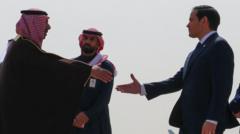President Trump’s recent pronouncement during a meeting with Jordan's King Abdullah II that the U.S. has the authority to "take" Gaza is stirring intense debate across international forums. His comments reiterate a controversial stance he has taken in the past week, where he suggested that the U.S. should take control of the war-torn region and resettle its residents, approximately two million Palestinians, into neighboring nations like Jordan and Egypt.
Trump's Bold Claim: U.S. Authority to "Take" Gaza Sparks Controversy

Trump's Bold Claim: U.S. Authority to "Take" Gaza Sparks Controversy
In a recent Oval Office meeting, Trump asserted the U.S. could seize Gaza, urging regional countries to absorb Palestinians.
During the impromptu press interaction, Trump emphasized that the U.S. would "cherish" Gaza once it secures control, highlighting a shift in U.S. foreign policy toward the Israeli-Palestinian conflict. However, King Abdullah's lukewarm response, which involved advocating for consultations with other Arab nations, indicates a delicate diplomatic balance is being maintained. Both Jordan and Egypt, critical players in Middle Eastern affairs, previously rejected Trump's suggestions, raising questions about the feasibility of such proposals.
The implications of Trump's comments could lead to heightened tensions in the region as they challenge existing norms around international law and sovereignty. Critics of the proposal assert that forcibly displacing people is inhumane and raises ethical concerns, complicating an already fraught geopolitical landscape.
In conclusion, while Trump's authority claim may be met with enthusiasm by some of his base, its reception around the world is far from supportive, highlighting the complexities of Middle Eastern politics and the deep historical roots of the Israeli-Palestinian conflict. As debates continue, the balance between U.S. objectives and regional stability hangs in the balance.
The implications of Trump's comments could lead to heightened tensions in the region as they challenge existing norms around international law and sovereignty. Critics of the proposal assert that forcibly displacing people is inhumane and raises ethical concerns, complicating an already fraught geopolitical landscape.
In conclusion, while Trump's authority claim may be met with enthusiasm by some of his base, its reception around the world is far from supportive, highlighting the complexities of Middle Eastern politics and the deep historical roots of the Israeli-Palestinian conflict. As debates continue, the balance between U.S. objectives and regional stability hangs in the balance.




















